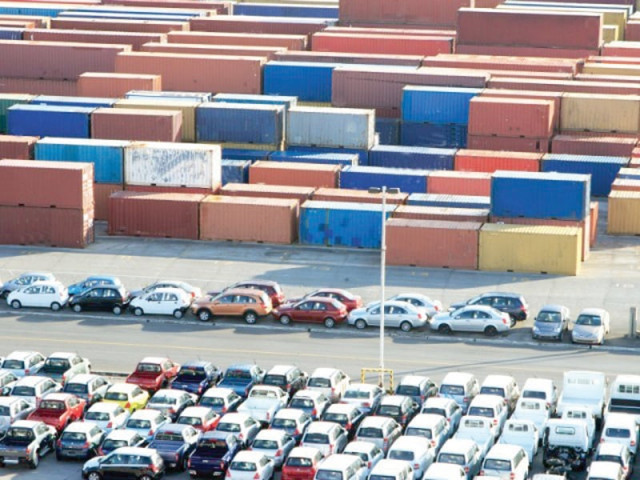Experts suggest curtailing non-essential imports
Propose income tax exemption limit to be set at Rs800,000

Experts suggest curtailing imports. PHOTO: FILE
They were speaking at the National Symposium on State of the Economy, organised by the Sustainable Development Policy Institute (SDPI) in collaboration with Beaconhouse National University.
Trade deficit shrinks as exports grow faster than imports
Experts emphasised that in order to ease the pressure on the current account, the government would need to focus on curtailing non-essential imports, promoting competitiveness of exporting enterprises, attracting foreign direct investment and encouraging greater remittance inflows.
Former minister and Planning Commission Deputy Chairman Sartaj Aziz said the government in the medium term should identify growth areas which were labour-intensive and technology-oriented to sustain growth.
“We should not overlook poverty and other social sectors,” he stressed. “Rather, we should take measures to expand the social safety net for the vulnerable group through the help of technology.”
He said the government should be careful while taking short-term measures as they should not affect the growth rate.
He urged the government to implement Pakistan’s first-ever National Water Policy, which was approved in April 2018, to overcome water-related challenges.
Former finance minister Hafeez Pasha pointed out that Pakistan’s revenues were not diverse enough and development expenditure had remained phenomenally high all the time.
“The structural problem over the last few years was the net revenue receipt of the federal government which has gone down,” he said. “This happened even though FBR’s targets rose including non-tax revenues and non-FBR taxes.”
Ban on import of luxury items urged
He was of the view that the problem arose due to revenue projection, which required adjustments.
He suggested that the government, in the short term, should raise the income tax exemption limit to Rs800,000 whereas the maximum tariff should be brought down from 30% to 25% while revising the Finance Bill 2017.
“The government should liberalise the economy while reducing import tariffs,” he stressed and suggested steps for widening the tax base such as compulsory filing of tax returns and registration of complaints.
He cited three areas that required serious attention in the Public Sector Development Programme which were water, power distribution and transmission and the China-Pakistan Economic Corridor (CPEC), all of which were engines of growth in the long run.
SDPI Executive Director Dr Abid Qaiyum Suleri lamented that it was unfortunate that the economy was being politicised in Pakistan.
“Macroeconomic imbalances, if not addressed in time, can put economic growth in danger,” he warned. “They can also threaten the prospects of long-term sustainable development.” Former State Bank of Pakistan governor Shahid Kardar said today Pakistan’s economy faced serious challenges of current account and trade deficits, which had peaked to exceptionally high levels. “Foreign exchange reserves are at a perilously low level and continuously under stress,” he lamented. “To check the increasing vulnerability of the rupee, the economy has to be stabilised on an emergency basis.”
Published in The Express Tribune, September 14th, 2018.
Like Business on Facebook, follow @TribuneBiz on Twitter to stay informed and join in the conversation.



















COMMENTS
Comments are moderated and generally will be posted if they are on-topic and not abusive.
For more information, please see our Comments FAQ